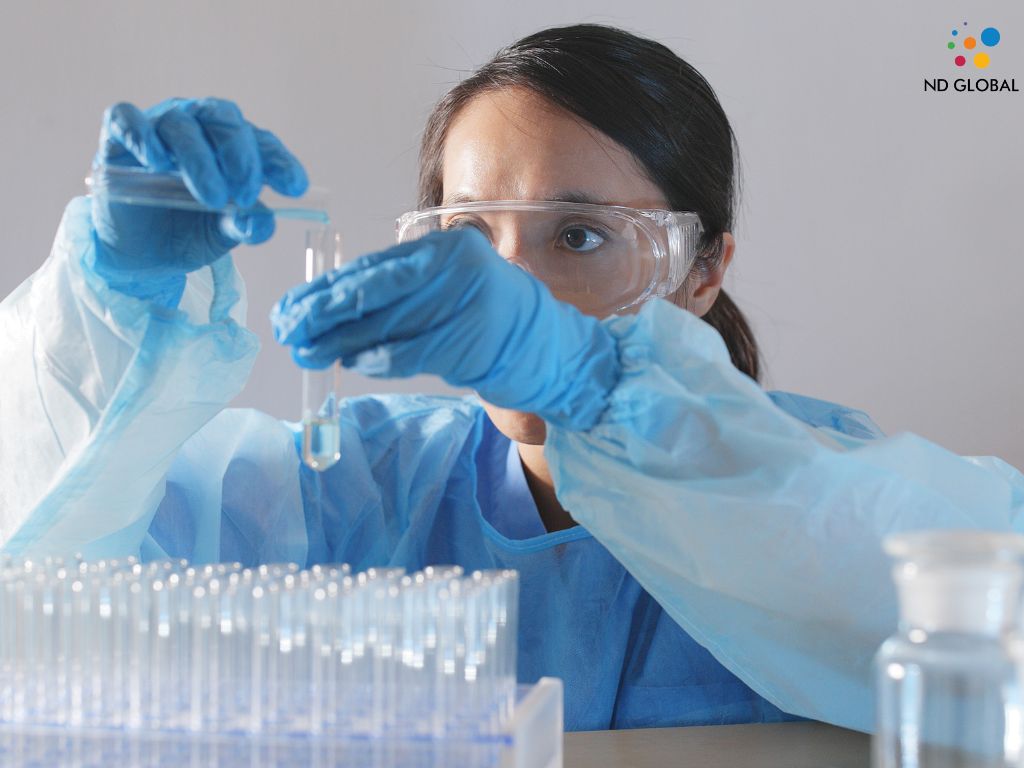Introduction – A laboratory technician performs mechanical, technical, or diagnostic testing in a lab or field environment. Senior technicians, scientists, or pathologists may oversee their work. Knowing more about the work role and related responsibilities is helpful if you want to pursue a career as a lab technician. This article looks at the requirements needed to become a lab technician, how to become one, and their duties and obligations.
What is the role of a lab technician? To put it briefly, laboratory technicians support scientists and engineers in the lab by helping with various experiments and inquiries. A laboratory technician performs routine tasks and special projects depending on the laboratory’s needs. Depending on the type of work the company hiring them specialises in, they may assist in the development of new products, in the diagnosis of illnesses, or in performing mechanical or diagnostic tasks. For instance, many occupations, such as lab technicians, are related to medicine and are found in hospitals, physician offices, and medical laboratories.
A technician’s role at educational institutions, such as schools and universities, involves supporting scientific instructors, lecturers, and students in the lab. Because technicians can handle a wide range of technical support tasks, their employment is frequently very diverse. This could be working alone and being accountable for the precision and calibre of their job, or it could be cooperating with other science technicians as a member of a larger team. Furthermore, this position may be full-time or part-time.
How do I Become a lab tech?
Understanding lab technicians and their tasks and responsibilities is the first step towards answering the issue of how to become one. They are professionals with training and qualifications who operate in industrial, scientific, and medical laboratories. They undertake experiments and tests in collaboration with other stakeholders and senior technicians. They record the procedures followed and the outcomes of the experiments and tests. They could also keep the laboratory’s equipment and workspace clean and hygienic to the required standards. processes to becoming a lab technician are as follows:
- Finish 10+2 in the science programme: The main prerequisite for becoming a lab technician is finishing 10+2 in the scientific stream with physics, chemistry, maths or biology as focus courses. After completing your 10+2, you can enrol in a lab technology diploma programme or degree study. Both programmes may include 10+2 with a science stream as a prerequisite for enrolment.
- Work for an official degree: An undergraduate degree or a diploma following 10+2 is another prerequisite for employment as a lab technician. Although certain businesses and private laboratories hire individuals with diplomas, major corporations and hospitals with multiple specialisations could require a bachelor’s degree as a prerequisite for employment. It is advantageous to have a bachelor’s degree if you wish to pursue higher education. You can specialise in a particular discipline, such as molecular biology, applied genetics, radiography, bacteriology, microbiology, or clinical pathology, with a postgraduate or master’s degree in a field connected to laboratory technology. You should think about obtaining the following credentials if you want to work as a lab technician:
- Diploma in ECG Technology
- Diploma in Medical Imaging Technology
- Diploma in Medical Laboratory Technology
- Diploma in Radiography Technology
- Diploma in Cardiovascular Technology
- Diploma in Medical Laboratory Assistant
- Diploma in Clinical Analysis
- BSc in X-ray Technology
- BSc in Medical Imaging Technology
- Bachelor of Medical Laboratory Technology (BMLT)
- BSc in Medical Laboratory Technology
- BSc in ECG and Cardiovascular Technology
- BSc in Clinical Laboratory Technology
- MSc in Medical Laboratory Technology
- Master of Medical Laboratory Technology (MMLT)
- MSc in Medical Imaging Technology
- MSc in X-Ray Technology
- MSc in ECG and Cardiovascular Technology
- Post Graduate Diploma in Medical Laboratory Technology
- Post Graduate Diploma in Laboratory Services in Science
- Post Graduate Diploma in Biomedical Laboratory Technology
- Finish your certification programmes: Courses leading to a diploma or degree improve employment possibilities. Certification programmes are quick courses designed to keep you updated on the most recent advancements in laboratory technology. Given the diversity of the field of lab technology, a certificate programme can assist you in gaining specialised knowledge related to your area of expertise. Take into consideration enrolling in the following certification programmes if you wish to work as a lab technician:
- Certification in Laboratory Technology
- Certification in Medical Laboratory Technology
- Certification in Blood Bank Technology
- Certification in Clinical Diagnostic Techniques
- Certification in ECG Technology
- Certification in Medical Record Technology
- Certification in Cath Lab Technology
- Obtain instruction: The majority of institutions provide lab technicians with hands-on training. While you’re in school or after, look for internship possibilities. Payed or unpaid interns are employed by large laboratories to help with sample collection, equipment maintenance, paperwork, and reporting responsibilities. Take advantage of these chances to keep your skills current while helping more experienced experts.
- Recognise how to apply academic ideas to practical work settings. Employers typically seek lab technicians who have received training in a related discipline. After completing an internship, it can help you when you begin applying for jobs. Newspapers, corporate websites, and social media platforms are good places to look for internship opportunities. Having work experience helps with accreditation and licencing as well.
- Arm oneself with the necessary knowledge: A lab technician may need extra talents and their educational background to succeed. Professionals in this entry-level position collaborate with senior stakeholders and work in teams. Having the necessary abilities could help you advance in your work quickly. If you’re eager to work as a lab technician, make sure you have the following skills:
- Analytical abilities. Analytical abilities are useful when it comes to deriving conclusions, evaluating, and interpreting unprocessed data. Every day, technicians could work with a lot of samples and a lot of data. One of a lab technician’s main responsibilities is to find patterns or relationships in data and report them to their superiors. As a result, having good analytical abilities is a must for lab technicians.
- Ability to solve problems: Problems like heat runoffs, pollution, injuries, and infectious surroundings are things that a lab technician would have to deal with. Their ability to solve problems solves them and helps them deal with them swiftly. It lets people view circumstances impartially and make the necessary decisions and actions.
- Organising abilities: Lab technicians review, examine, evaluate, and note findings from large amounts of data. They also use pricey, sophisticated equipment in their work. Sustaining a neat workstation is essential for precision and mitigating the likelihood of accidents in the laboratory.
- Communication abilities: Lab technicians ensure their findings and analyses are accurately recorded, reported, and documented. They can maintain thorough documentation using effective written and vocal communication abilities.
- Time management abilities: Tests, analyses, and experiments may have time constraints since delays can compromise the precision and calibre of the findings. They can finish their work more quickly by setting priorities and following timetables. Since lab technicians can multitask all the time, time management is a crucial competency for them.
- Compose a resume: If you’re applying for a competitive career, such as a lab technician, a well-written resume will help. Your resume should begin with a summary. List your credentials, licences, and previous employment and internship experiences in reverse chronological order. Emphasise any work history that could apply to your current position. Before using, update your CV with pertinent details such as your current role and expected income.
- Lab technician
- Senior lab technician
- Supervisor
- Assistant Manager
- Manager
- Lecturer
- Professor
- Entrepreneur
- Consultant
Who Hires Lab Technicians and What Are They? The government employs lab technicians in science, education, welfare, health, and quality control. Lab technicians might be used by pharmaceutical companies, chemical companies, food and beverage makers, hospitals, diagnostic labs, colleges, universities, and companies that carry out a lot of research and development. Senior lab technicians with the qualifications can work as lecturers at colleges and institutes. Some lab technicians pursue careers as technical writers, creating student manuals and research and diagnostic lab handbooks.
What Are a Lab Technician’s Tasks and Accountabilities? Typical tasks for lab technicians include data processing, information recording, inventory tracking, and upkeep of instruments, equipment, and work areas. The chemical industry tests various goods and procedures to ensure a product complies with established standards and rules. In a diagnostic lab, they might check for germs in blood and urine samples. They could examine goods in the food and beverage sector to look for contamination. If they work in a scientific research lab or university setting, they might help more experienced scientists with the activities involved in documenting data and conducting experiments. Typical duties for a lab technician include:
- Adjusting and calibrating equipment in the laboratory
- Cleaning and maintaining a sterile atmosphere in laboratories
- Maintaining an inventory by tracking and ordering supplies
- Gathering data for experiments
- Identifying and collecting appropriate samples as per instructions
- Documenting results of tests and experiments.
- Competent operation of technological tools and apparatus
- Acceptably delivering scientific data, frequently using digital software.
Identifying difficulties or complexities and using the proper scientific techniques to find solutions
- Maintaining scientific equipment, keeping labs hygienic, safe, and clean, and ensuring scientists can access supplies.
Conclusion – Pursuing a career as a laboratory technician requires a combination of education, training, and practical experience. Once employed, lab technicians are responsible for various tasks, including equipment calibration, cleanliness and sterility, inventory management, experiments, and documentation. These tasks ensure the accuracy and integrity of scientific research and diagnostic testing across different industries. Becoming a lab technician requires dedication, continuous learning, and a commitment to excellence in scientific work. With the right combination of education, training, and skills, individuals can embark on a rewarding career in this vital field of science and technology.
How ND Global can help: As a staffing agency, ND Global can play a crucial role in helping individuals pursue a career as a lab technician by providing assistance and resources at various stages of the process. Here’s how ND Global can help:
- Access to Diverse Job Opportunities: ND Global’s extensive database likely contains job listings from various industries and sectors, including healthcare, pharmaceuticals, research, education, and more. Lab technicians can benefit from access to a wide range of job opportunities, allowing them to explore different career paths and find positions that best match their skills, qualifications, and preferences.
- Streamlined Application Process: ND Global’s platform likely offers a streamlined application process, allowing lab technicians to submit their applications efficiently and track their progress through the recruitment process. This saves time and effort for candidates and increases their chances of securing interviews and job offers.
- Networking Opportunities: ND Global may facilitate networking opportunities for lab technicians by connecting them with hiring managers, industry professionals, and other candidates through online forums, networking events, and social media platforms. Networking can be a valuable tool for discovering hidden job opportunities and building professional relationships within the industry.










